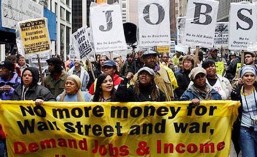ECONOMY OF NAZI GERMANY
repost from anonomous
HIGH UNEMPLOYMENT
Nazis came to power in the midst of the Great Depression. When the Nazis came to power the most pressing issue was an unemployment rate of 30%. [17] Before World War II, Hitler appointed Hjalmar Schacht, a former member of the German Democratic Party, as President of the Reichsbank in 1933 and Minister of Economics in 1934.
KEYNESIAN DEFICIT SPENDING
Policies were Keynesian, relying on large public works programs supported by deficit spending – took advantage of the freedom provided by the end of the gold standard to keep interest rates low and government budget deficits high, with massive public works funded by large budget deficits.
ANTI-UNION
Trade unions were abolished, as well as collective bargaining and the right to strike. [45] The right to quit also disappeared: Labour books were introduced in 1935, and required the consent of the previous employer in order to be hired for another job.
HIGH MILITARY SPENDING
They also directed Schacht to place more emphasis on military production and rearmament.In 1936, military spending in Germany exceeded 10% of GNP, higher than any other European country at the time, after years of limitations imposed by the Versailles Treaty. Military investment also exceeded civilian investment from 1936 onwards
STATE SPONSORED ENTERPRISES
the German state came to play an increasing dominant role in the German economy through state-owned companies
FASCISM: BIG BUSINESS & STATE
As big business became increasingly organized, it developed an increasingly close partnership with the Nazi government. The government pursued economic policies that maximized the profits of its business allies, and, in exchange, business leaders supported the government’s political and military goals
The largest firms were mostly exempt from taxes on profits
LOWERED LIVING STANDARDS
While the strict state intervention led to full employment during the 1930s, real wages in Germany dropped by roughly 25% between 1933 and 1938.
Unrest caused by the breakdown of German social policies, and the sharp drop in living standards for the German working class forced Hitler into going to war at a time and place not of his choosing.
WAR AS FOREIGN POLICY
when faced with the deep socio-economic crisis the Nazi leadership had decided to embark upon a ruthless “smash and grab” foreign policy of seizing territory in Eastern Europe which could be pitilessly plundered to support living standards in Germany.
ANY OF THIS SOUND FAMILIAR AMERICANS?
